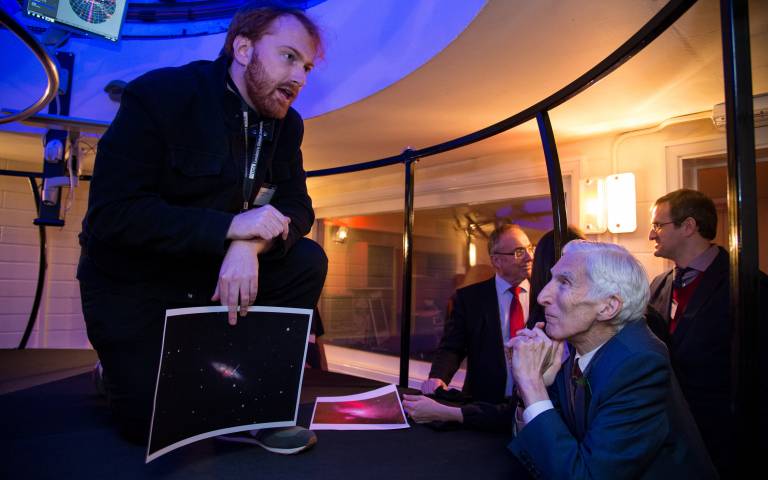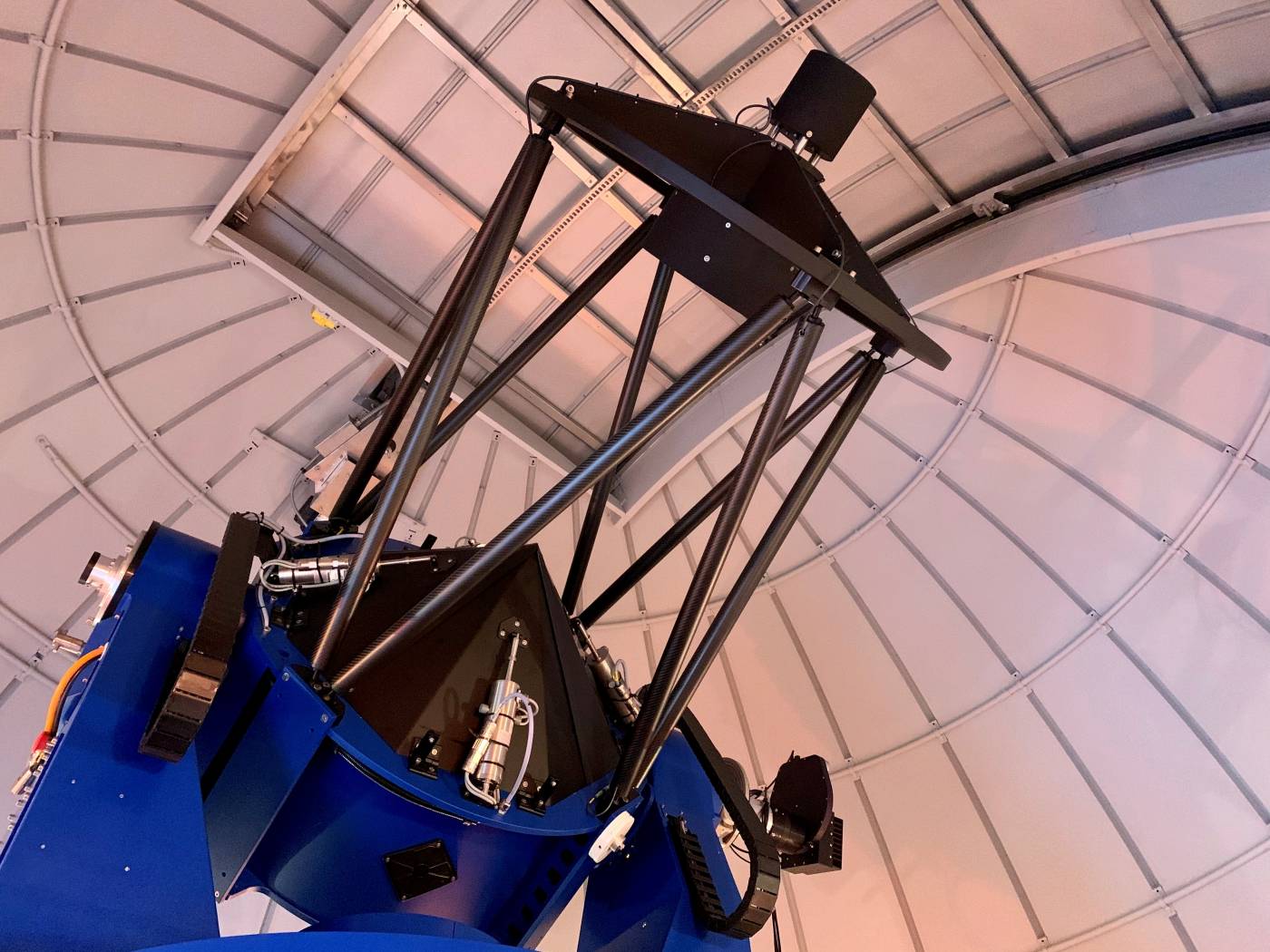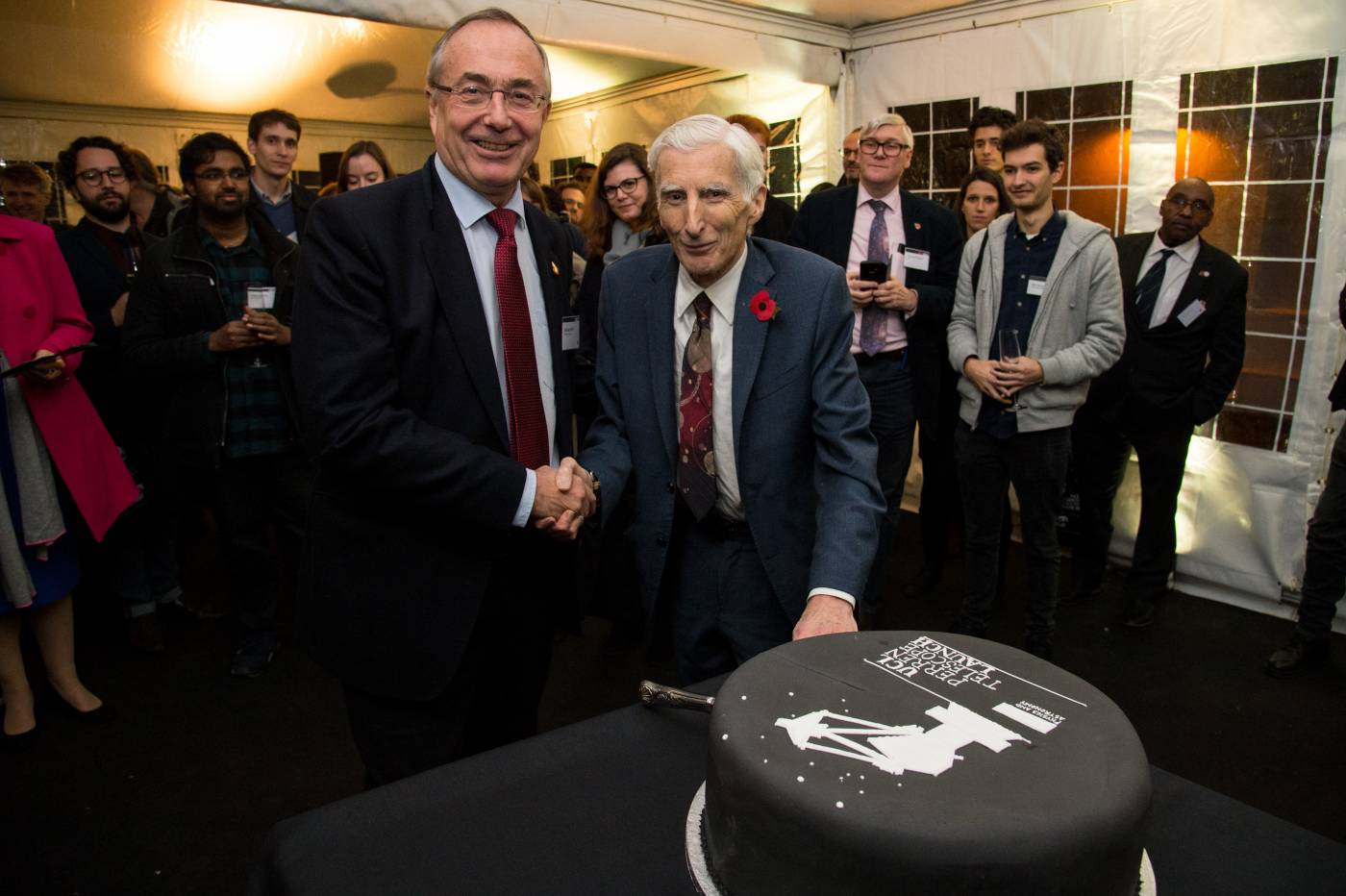UCL Observatory celebrates 90 years with new telescope unveiling
6 November 2019
The new, state-of-the-art Perren telescope was unveiled today at the UCL Observatory (UCLO) by Astronomer Royal, Lord Martin Rees, to celebrate 90 years since the observatory was first opened by then Astronomer Royal, Sir Frank Watson Dyson.

The event also marks 100 years to the day since Professor Arthur Eddington and Sir Frank reported the first experimental evidence for general relativity using the 1919 Solar Eclipse – the discovery that made Albert Einstein a household name.
Located in Mill Hill, UCLO is one of the best-equipped astronomical facilities for student training and research in the UK. The newly installed 80cm reflector is the facility’s biggest telescope and joins a suite of five permanently mounted telescopes housed in the observatory’s iconic domes.
The telescopes are used by UCL staff and students to study planets within and outside of the solar system, asteroids and other transient phenomena such as supernova and microlensing events. They are also used to provide practical astrophysical techniques and data handling training.
During a workshop in 2014, a supernova in the galaxy M 82 was discovered by four undergraduate students assisted by Dr Steve Fossey, leading to a global scramble to acquire confirming images and spectra of a supernova in one of the most unusual and interesting of our near-neighbour galaxies.
Professor Michael Arthur, UCL President & Provost, who attended the unveiling, said: “The ground-breaking discoveries made at the UCL Observatory, such as the first sighting of a supernova by our first year students epitomise the benefits of research-based education that we are proud to offer all undergraduates across UCL. With the new Perren telescope, we are providing our students with the best-equipped teaching observatory in the UK and I look forward to seeing what mysteries of the universe they uncover next.”
Since its first opening and to this day, the observatory regularly hosts free public open evenings and school visits to excite young minds about the challenges and rewards of a career in astrophysics and space sciences.
Professor Giorgio Savini, Director of the UCLO, said: “The unveiling marks the completion of a 14-year fundraising process and substantial renovation of our astronomical teaching observatory, which is scientifically transformative for UCL Physics & Astronomy.

“In addition to the new Perren telescope, we have the restored 1862 Fry refractor telescope, the Radcliffe refractor telescope and two robotic Celestron C14 telescopes. We are also part of a collaborative network of robotic telescopes, TelescopeLive, based in Chile, Australia and Spain to allow full sky access to our students and both on-site and off-site observations. These, along with classroom space and a specialist astronomy library, make the UCL Observatory a historically important site fit for the demands of twenty first century scientific inquiry.”
Professor Raman Prinja, Head of UCL Physics & Astronomy, said: “UCL is at the forefront of many discoveries concerning exoplanet science, cosmology and stellar astrophysics, and contributes to ambitious international collaborations to probe the most elusive and mysterious phenomena in the cosmos, from black holes to dark matter. It is only fitting that our astronomical observatory provides the best technology and environment to educate and train the next generation of astrophysicists to push the boundaries of knowledge even further.”
Lord Martin Rees, Astronomer Royal, said: “Astronomy is a fundamental science and it is also the grandest environmental science. I am sometimes asked ‘what perspective does astronomy give to us regarding everyday life?’ I think there is one thing it does, which is to give us an awareness of the far future. This century is special. This is the first century in the 45 million from which Earth existed in which one species, ours, has the future in its hands. We are living on this pale blue dot in the cosmos, which is a special place, and we are here at a special time. That is a salutary thought for all of us, whether we are astronomers or not.”

Links
- Professor Giorgio Savini's academic profile
- Professor Raman Prinja's academic profile
- UCL Observatory
- UCL Physics & Astronomy
- UCL Faculty of Maths & Physical Sciences
- Media coverage
Images
UCL PhD student Hamish Caines shows the image of the UCLO supernova discovery to Lord Martin Rees, Astronomer Royal credit: Kirsten Holst
The new Perren telescope
UCL President & Provost, Professor Michael Arthur and Astronmer Royal, Lord Martin Rees cutting the celebratory cake credit: Kirsten Holst
Media contact
Bex Caygill
Tel: +44 (0)20 3108 3846
Email: r.caygill [at] ucl.ac.uk
 Close
Close

